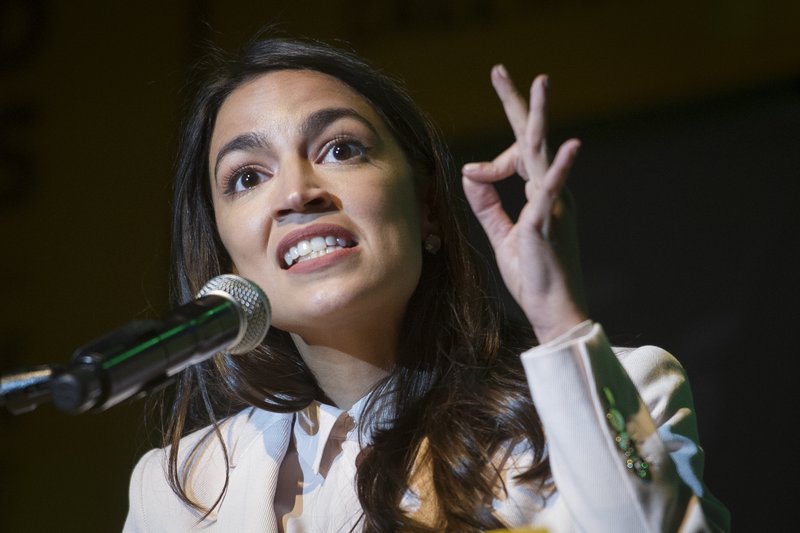Somewhere out there, the next Alexandria Ocasio-Cortez lurks. So wary House Democrats are amassing campaign war chests to scare off progressive upstarts from challenging them in primaries — or trounce them if they try.
A look at 41 incumbent House Democrats who face potential 2020 party primary opponents shows 16 have already stockpiled over $1 million in campaign funds. The figures from Federal Election Commission reports for the first six months of this year show that 20 raised over $500,000 during that period alone.
That’s not stopping challengers from targeting powerful committee chairmen and other well-financed incumbents, though the hurdles they face are clear.
So far only four Democratic challengers in these races have at least $100,000 socked away. The most is $352,000 by business consultant Marie Newman, who’s waging a primary rematch against Illinois Rep. Dan Lipinski, one of Congress’ most conservative Democrats. He has double her cash on hand, though she’s out-raised him so far this year.
“If you don’t have the money to fight an air war, you fight a ground war,” Monica Klein, a New York consultant who works with progressive Democrats, said of challengers who often lack money for TV commercials. “You try to out-organize your opponent and have those conversations at the doors, on the phone, face to face.”
Many challengers have barely started their campaigns but the early figures underscore a cold reality. Even with today’s energized and increasingly well organized progressive movement , incumbents’ fund-raising advantages — plus their name recognition and connections — are usually insurmountable.
The list of Democratic incumbents facing primary challenges will grow considerably, but most of those races won’t be truly competitive.
Ocasio-Cortez rocketed to influence and celebrity and is now a New York congresswoman after unexpectedly toppling 10-term veteran Rep. Joseph Crowley in their 2018 Democratic primary. Crowley, who was seen as potentially the next House speaker, spent over $3 million, multiples of Ocasio-Cortez’s expenditures.
A political unknown, Ocasio-Cortez relied on contributions of $200 or less for two-thirds of her money. Accumulating numerous small donations has become the gold standard of progressive campaigns, since givers can make repeated contributions and become campaign volunteers. So far this year, no major challengers in the races studied have raised AOC-like proportions of small donations.
Upsets like Ocasio-Cortez’s are rare. She, Rep. Ayanna Pressley, D-Mass., and two Republicans were the only primary challengers to oust any of the 376 House incumbents seeking re-election last year, meaning 99% of incumbents were re-nominated. Since World War II no more than 5% of incumbents have lost primaries, which happened in 1992.
Even so, leading Democrats are urging lawmakers to be aggressive fund raisers.
“My advice to any incumbent in this volatile environment: Take nothing for granted,” said former Rep. Steve Israel, D-N.Y., who once led House Democrat’s campaign organization.
Rep. Richard Neal, D-Mass., chairs the House Ways and Means Committee and has a liberal voting record. He’s banked nearly $4 million but 30-year-old Alex Morse, the mayor of Holyoke, recently announced his candidacy anyway, asserting that Neal isn’t doing enough for western Massachusetts.
Morse, who is openly gay, hasn’t reported raising any money yet and says he’ll need at least $1.5 million for his effort. He says he’s rejecting money from corporate political action committees, which are dirty words among progressives, and says he will do “town halls, knock on doors, show up in living rooms of people who have never met me.”
Said Neal, “I’m going to take the race seriously.”
House Judiciary Committee Chairman Jerrold Nadler of New York, a leader of Democratic investigations into President Donald Trump, faces opponents including Lindsey Boylan, 35, a former state economic development official. Boylan has already banked $240,000, impressive for a challenger but a quarter of Nadler’s cache.
Rep. Eliot Engel, D-N.Y., chairman of the House Foreign Affairs Committee, has $187,000 cash on hand, a modest amount for his Bronx and Westchester County district. The 16-term veteran, who says he prefers waiting until election years to raise money, could face a significant challenge in his racially mixed area from Jamaal Bowman, a black educator. Bowman, Morse and several others are backed by Justice Democrats, the progressive group that recruited Ocasio-Cortez to run last year.
Even No. 2 House Democratic leader Steny Hoyer of Maryland faces liberal challengers, though he’s flashed his fundraising chops by collecting nearly $1.3 million in just six months.
Moderate incumbents who could be natural targets for progressives are also taking no chances.
Second-term Rep. Josh Gottheimer, D-N.J., a leader of a bipartisan House coalition that seeks middle ground on issues, has nearly $5.7 million socked away so far, raising more than $1.7 million of it this year through June. Both figures surpass any of the other Democrats examined, and Gottheimer’s lone Democratic challenger has reported having no money.
Three other Democrats centrists have each banked at least $2.7 million and far outraised their challengers: Reps. Bill Foster of Illinois, Henry Cuellar of Texas and Kurt Schrader of Oregon.
The few incumbents reporting little cash on hand include Reps. Alcee Hastings of Florida, Bobby Rush of Illinois, Tulsi Gabbard of Hawaii and Seth Moulton of Massachusetts. Gabbard and Moulton are running for president and could shift funds to their House campaigns if they abandon their presidential bids.
Underscoring the difference incumbency can make, a report Ocasio-Cortez filed three weeks before her 2018 primary showed she’d raised just $300,000. She’s now a fundraising giant.
In her first six months in Congress, she reported raising nearly $2 million. While that’s effectively a warning sign to anyone considering running against her, she suggested in an interview that she may use it to help fellow liberals, perhaps some challenging House colleagues.
She said she is “extremely dedicated to keeping the Democratic majority, but also to growing the progressive plurality” among House Democrats.
(AP)











